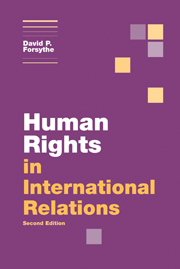Book contents
- Frontmatter
- Contents
- Preface to the second edition
- Preface to the first edition
- Part I The foundations
- Part II Implementing human rights standards
- 3 Global application of human rights norms
- 4 Transitional justice: criminal courts and alternatives
- 5 Regional application of human rights norms
- 6 Human rights and foreign policy in comparative perspective
- 7 Non-governmental organizations and human rights
- 8 Transnational corporations and human rights
- Part III Conclusion
- Index
7 - Non-governmental organizations and human rights
from Part II - Implementing human rights standards
- Frontmatter
- Contents
- Preface to the second edition
- Preface to the first edition
- Part I The foundations
- Part II Implementing human rights standards
- 3 Global application of human rights norms
- 4 Transitional justice: criminal courts and alternatives
- 5 Regional application of human rights norms
- 6 Human rights and foreign policy in comparative perspective
- 7 Non-governmental organizations and human rights
- 8 Transnational corporations and human rights
- Part III Conclusion
- Index
Summary
By now it should be clear that states, acting frequently through international organizations and/or diplomatic conferences, produce the international law of human rights by concluding treaties and developing customary law. The resulting law obligates states, primarily. In chapter 6 we examined state foreign policy against the background of the international law of human rights. But private actors can be important at both ends of this process, affecting legislation and implementation.
This chapter starts with an analysis of non-governmental organizations and their advocacy of human rights ideas, which is directed both to the creation and application of human rights norms. Probably the best known of these groups is Amnesty International. This analysis is eventually set within the confines of social movements. Such actors push for more liberalism in the form of human rights protection in international relations. The chapter then turns to those private groups that are mostly called relief or development agencies, or sometimes PVOs (private voluntary agencies) or VOLAGs (voluntary agencies). A classic example is Oxfam. These private actors are crucial especially for grassroots action that directly or indirectly attends to social and economic rights. Most can be said to be liberal or pragmatic-liberal actors, in that they emphasize policies for the betterment of individuals under legal norms, rather than emphasizing the collective national interests of states as pursued through the application of power.
- Type
- Chapter
- Information
- Human Rights in International Relations , pp. 188 - 217Publisher: Cambridge University PressPrint publication year: 2006



